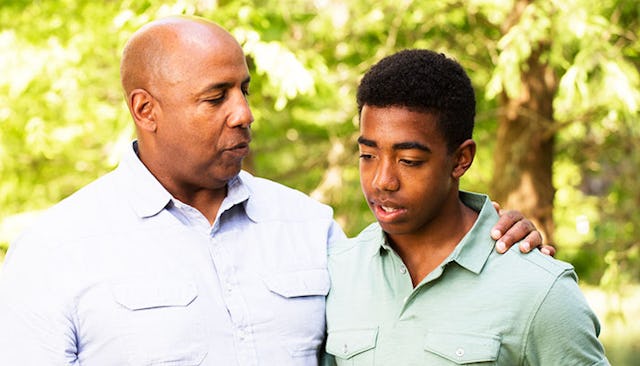4 Words To Help You Get Past The Mistakes You Make In Life

What do you tell yourself when you make a mistake? I never used to tell myself anything. I would just stew in shame.
When you do something wrong, there is an instinctive reaction that kicks in. A voice that comes on over the loudspeaker in your brain. One that has most likely been there since childhood. What does yours say?
Mine goes back to the voice of my father. I must have been around 10 years old, and I opened my big mouth to my teacher during seventh-grade math. My parents received a phone call from the school, and my father led me to the living room of our home. It was the room children were not allowed to enter.
He told me to be seated on the white couch we got from my grandparent’s Park Avenue apartment when they died. I hardly ever had the privilege of sitting there. In a low voice, my father said, “You shamed the family name.”
It felt like the walls of the living room were closing in on me and all the Litchfields in the world would hear about this, how their family name was shamed by a seventh grader. That was all the reprimand I received, no other “real” punishment. I went back upstairs, and no one spoke of this again. No one asked me for my side of the story or gave me further instructions to examine my actions and what led to them, as I was usually a respectful good kid.
I did not realize that this was a pivotal moment of learning how to react to a mistake for me. Why I crawled into a hole inside my shameful self whenever I made a mistake, and I worked so hard to do things perfectly. When I failed in some way, I would go into hiding.
I always wondered why some people could make mistakes and shrug them off. I thought they were just stronger than me, braver. Yet that was not true. How you were taught to handle mistakes as a child may be an important key to successfully moving on from stumbles in life, big or small.
Here are four magic words: Do better next time. As Maya Angelou says, “When you know better, you do better.” She doesn’t say, “When you mess up, beat yourself up first and feel like a piece of garbage, because you should be ashamed of yourself,” because it is not helpful.
Some people head over to the addiction of their choice when shame comes calling. Who knows, maybe the root of addiction is just an imperfect human being not being able to accept a mistake they made. It’s not even about mistakes being a learning experience. How else does a child learn to walk? How does an Olympian learn to dive? By falling. By doing belly flops. By being told that they can try again.
Being present to life, being in the present moment is impossible when you’re wallowing in your mistakes. Only once you accept that it’s OK to recognize your actions for what they are or aren’t and decide to do better next time can you move on.
What do you tell a child when they make a mistake? Dr. Shefali Tsabary writes in her book, The Conscious Parent:
“When any of us makes a mistake, we must first forgive ourselves, show compassion to ourselves, then let ourselves off the hook. Mistakes need to be regarded not as something to harangue and punish, but as windows for learning.
“If you want your child to learn from their mistakes, any sense of wrongness needs to be removed, so they realize that no matter how much they mess up, they are still ok. Only when your children are free of fear can they extract the lesson they need.
“When we presume we understand the motivation behind our children’s actions…we trigger in them a sense of helplessness…we pile feelings of inadequacy upon them…ridicule them…and expect more from them than they are willing or even able to give.”
Our kids see how we handle our own stress and mistakes, and they copycat those emotions. When they see that mistakes are inevitable for adults and kids alike, they are free of feelings of failure and can become comfortable with mistakes themselves.
What may have helped me when I lashed out at my teacher might have been an understanding parent who helped me uncover what led to the mistake. Knowing why I behaved that way may have helped me to make the changes I needed.
What voice do you have in your head when you make a mistake? Try telling yourself the four magic words and see what happens: Do better next time.
Mistakes in life are expected, so deal with them and let them go. It’s empowering to have those words coming out of the loudspeaker in your head instead.
This article was originally published on